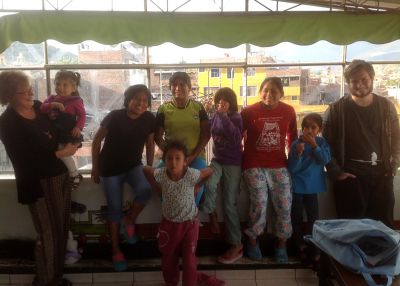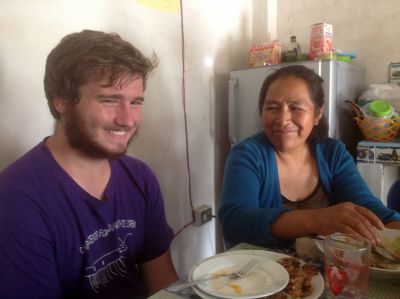My Many Peruvian Names
Ammon Allen-Doucot shares a journal entry. During service, he worked in Ayacucho at Casa Luz, a home for children who have been abandoned or whose parents are otherwise unable to care for them.

Names matter a great deal to me. My parents would always explain in detail the significance of having two last names. Why it mattered that both were part of who I am. They discussed at length where my first name comes from, one part traditional Irish, one part early Catholic Worker. All in all, I have six names: Ammon Edward O’Reilly Allen John Doucot. Ammon is my birth name; Edward is my middle name; O’Reilly is the name my family registered with the Irish-American Home Society; Allen is my mother’s last name; John is my saint’s name; and Doucot is my father’s last name.
In Peru, however, I go by Ammón. I knew I would do this going in because the Puerto Rican abuelas in my neighborhood in Hartford, Conn., have always insisted that this is the right way to say it. That being said, Ammón grants a little bit of fun. As I am slightly larger than the average Peruvian, I have had a “J” added to the beginning of my name on many occasions, making me Jamón (ham). This always makes the kids here laugh until they cannot breathe. It is a small leap from Jamón to Jabón (soap). So I get teased about this as well.
When I introduced myself at Casa Luz, the tias (or caregivers) all thought I said my name was Amor (love). Based off of how much I love the kids they thought it was appropriate.

My mother in Ayacucho thinks all of these names are funny and will use each and every one over the course of a conversation, and what’s more, she added her own name to the list two days ago.
I had been hanging my towel out my window to dry and the wind caught it, blowing it out onto the ledge. I climbed out the window to retrieve it. Long story short: my neighbors saw and informed my mother, who broached the topic by telling me that the neighbors saw “un oso blanco,” or a white bear, “going into your window today.” It was only appropriate that I was wearing my Spider-Man shirt. Herbert, my brother, lept to my defense, saying, “Don’t worry, Mom, he’s El Hombre de Araña.”
In Lima my family had three names for me. All of them were given to me by Leo, my host brother, who is 3 years old. Leo, who always has ito added to his name, tends to add it to everyone else’s name. When I called him Leito, he would call me Amito; and when I called him Leonardito, he would call me Ammoncito. Also, when I would come back with a sunburn and lighter hair, he would call me Tio Sol, or Uncle Sun.
All of these names have made me feel more a part of Peru than I had anticipated, and all of them describe a part of me. I am Ammon, Ammón, Jamón, Jabón, El Oso Blanco, El Hombre de Araña, Amito, Ammoncito and Tio Sol.
* * * * *
Millie was one of the first kids I met at Casa Luz. She is ready with a smile and a cry of “Tio!” every time she sees me. She is 4 feet and a couple of inches tall. Her favorite clothing is a pair of “Hello Kitty” pajama pants. I’m basing this judgment — that the pants are her favorite clothing — on the tender care they receive when she cleans them. Most of the clothing Millie is supposed to wash is thrown around as she plays in the water, while these pants are methodically scrubbed; as soon as they are clean, she asks for help in hanging them up in the sunniest portion of the clothes line.
Millie is one of the hardest children to work with at Casa Luz. Not because she is mentally disabled, which presents its own set of challenges and problems. It is infinitely more frustrating and maddening to see the other children bully her. The tias and I are the only ones who call her Millie. The other kids call her Mona and Monca, meaning monkey. They often kick and push her. I do my best to stop them but I consistently lack the proper vocabulary and credibility to get the kids to really stop.
Millie has been at Casa Luz most of her life. My mother told me that she was found in the back of a truck from jungle. Her family had apparently abandoned her because it was evident that she was mentally disabled. I don’t know what will happen when Millie grows up and neither do the tias. One said she might go to a church or hospital to live.
Despite all of this Millie still smiles more , prays more and laughs more than the other kids. That laugh will probably stay with me longer than anything else I bring back from Peru.




